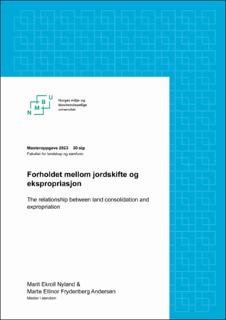| dc.contributor.advisor | Ingrid Wang Larsen | |
| dc.contributor.author | Nyland, Marit Ekroll | |
| dc.contributor.author | Andersen, Marte Ellinor Frydenberg | |
| dc.date.accessioned | 2023-07-18T16:28:23Z | |
| dc.date.available | 2023-07-18T16:28:23Z | |
| dc.date.issued | 2023 | |
| dc.identifier | no.nmbu:wiseflow:6839533:54591847 | |
| dc.identifier.uri | https://hdl.handle.net/11250/3079911 | |
| dc.description.abstract | Sammendrag
Jordskifteloven gir jordskifteretten vid kompetanse til å endre både eiendommers fysiske grenser og rettighetsforhold til fast eiendom. Ekspropriasjon er det sterkeste inngrepet i den private eiendomsretten ved at det gjennomføres et tvangserverv av eiendom eller rettigheter.
Høyesterett uttalte i HR-2019-1152 at «[...] jordskifte i sin grunnleggende natur kan beskrives som en slags ekspropriasjon mot naturalerstatning». I vår avhandling sammenligner vi de to institusjonene. Det følger av analysen at arealbytte etter jordskifteloven § 3-4 kan omtales som en form for ekspropriasjon, men at dette ikke er en passende beskrivelse for bruksordning etter jordskifteloven § 3-8.
Avhandlingen viser en utvikling, jordskifte fra rural til urban og ekspropriasjon fra offentlig mot privat. Utviklingen har påvirket motivasjonen for å kreve jordskifte, og at motivet kan være sammenfallende med motivet for å kreve ekspropriasjon. I de tilfeller arealbytte gjennomføres med tvang og formålet er å tilegne seg et bestemt areal, blir grunneier tvunget til å avstå areal i likhet med ekspropriasjon. Ulikheten viser seg ved om kompensasjon til grunneier utmåles i annen fast eiendom eller i penger.
Analysen viser at lovreguleringen av de materielle vilkårene ved avståelse av areal ved jordskifte og ekspropriasjon i det vesentlige er sammenfallende. Ulikheten vises der samfunnsinteresser ikke er begrunnelse for å gjennomføre arealbytte. Lovgivers regulering av grunneiers rett til erstatning av nødvendige sakskostnader i forbindelse med grunnavståelse, er ulikt ved jordskifte og ekspropriasjon. Eksempelvis dekkes ikke grunneiers utgifter til sakkyndig bistand ved jordskifte. Der sakskostnadsreglene skiller seg fra hverandre, reiser dette spørsmål til konsekvensen av å omtale jordskifte som en form for ekspropriasjon. | |
| dc.description.abstract | Abstract
The Norwegian Land Consolidation Act (hereinafter LCA) grants the Norwegian Land Consolidation Court extensive authority to alter both the physical boundaries of properties and the property rights. Expropriation remains the most substantial infringement on private property rights as it involves the compulsory acquisition of property or property rights.
On the basis of the Norwegian Supreme Court’s statement in HR-2019-1152, in which land consolidation can be described as a form of expropriation with natural compensation, the distinction between the two institutions will be analyzed. This analysis demonstrates that modifications to property and perpetual easements under section 3-4 of the LCA can be described as a form of expropriation but this is not a suitable description for rules on joint use under section 3-8 of the LCA.
The thesis shows a historical overview which demonstrates a development, land consolidation has gone from rural to urban and expropriation from public towards private. This development has affected the motivation for demanding land consolidation, and the motive may coincide with the motive for demanding expropriation. If modifications to property and perpetual easements are carried out by compulsion and the purpose is to acquire a specific property, the owner is forced to abstain the property in similarity with expropriation. The compensation for the acquisition differs, where it is either given in monetary compensation or natural compensation in form of other property/property rights.
This analysis shows that the conditions and legal requirements established for expropriation are essentially coincident with the requirements for land consolidation. The disparity is shown where public interests are not a justification for carrying out land consolidation. The legal consequence of expropriation in which the owner is entitled to reimbursement of legal costs are not coinciding with the legal consequences of land consolidation. Parties in land consolidation are responsible for their own legal costs. The overarching question which then arises, is the legal significance of land consolidation being considered a form of expropriation. | |
| dc.language | nob | |
| dc.publisher | Norwegian University of Life Sciences | |
| dc.title | Forholdet mellom jordskifte og ekspropriasjon | |
| dc.type | Master thesis | |
